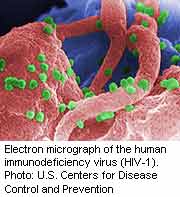
MONDAY, Sept. 23 (HealthDay News) — A common drug used to treat nail fungus may hold promise against HIV, the virus that causes AIDS, according to a new study.
In laboratory research, the anti-fungal drug Ciclopirox allowed HIV-infected cells to get killed off by blocking the cells’ mitochondria — their powerhouse. In addition, Ciclopirox eliminated HIV from cell cultures, and the virus did not return when the anti-fungal drug was stopped, the study authors said.
This does not occur with currently available anti-HIV drugs, which must be taken for the rest of a patient’s life, said study leaders Michael Mathews and Hartmut Hanauske-Abel, of the Rutgers New Jersey Medical School.
The effectiveness of Ciclopirox against HIV needs to be confirmed in human clinical trials. But because the drug is already approved by the U.S. Food and Drug Administration for treatment of fungal infection and is considered safe, the clinical trial process for this treatment could be quicker and less costly than usual, the researchers said.
The study is published in the current edition of the journal PLoS One.
The use of combination antiretroviral drugs have vastly improved HIV treatment, the study authors said in a Rutgers news release. These so-called drug cocktails are effective at keeping HIV under control, but they never completely eradicate the infection.
HIV’s persistence is partially due to its ability to disable a cell’s so-called suicide pathway, which is normally triggered when a cell becomes infected or damaged.
More information
The U.S. National Institute of Allergy and Infectious Diseases has more about HIV treatment.
Copyright © 2025 HealthDay. All rights reserved.

